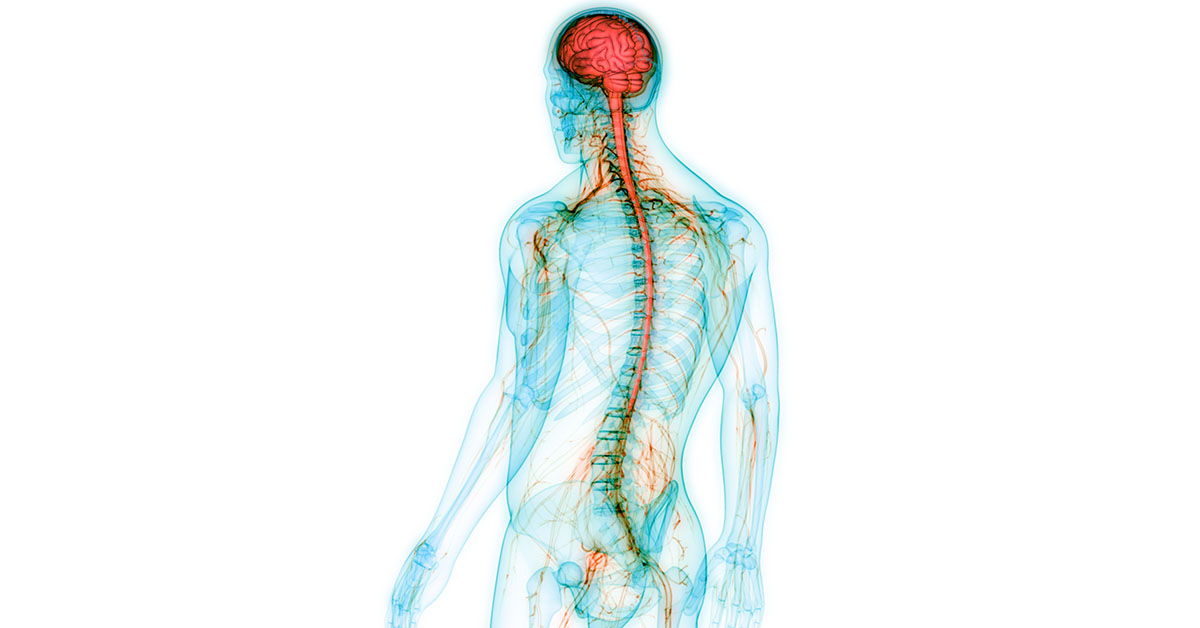
The body’s nervous system is made up of two major parts, the central nervous system, and the peripheral nervous system. These two parts of the nervous system act jointly to assure your body is communicating all of its sensory information and needs. The central nervous system and the peripheral nervous system each play different roles in controlling your body’s functions.
Central Nervous System
The central nervous system (CNS) is made up of the brain, cerebellum and the spinal cord
The Spinal Cord
The spinal cord directs signals from the brain to the body and is capable of controlling simple reflexes without transmitting information from the brain.
The Brain
The brain processes most of the body’s sensory information and is responsible for coordinating conscious and unconscious body functions including feeling, thinking, and maintaining homeostasis, which is the body’s ability to maintain a stable environment. The brain is made up of three regions, the forebrain, the midbrain, and the hindbrain.
- The Forebrain: The forebrain works to process the information needed to complete complex cognitive tasks. The parts of the forebrain are responsible for sensory functions, voluntary motor skills, speech, and critical thinking. It also controls homeostasis which is maintained through regulation of body temperature, blood pressure, pleasure, pain, hunger, and thirst as well as hormone production.
- The Midbrain: The midbrain connects the forebrain and the hindbrain and carries the important job of connecting the brain to the spinal cord. It processes sounds and sights and works to control the movement of the eye.
- The Hindbrain: The hindbrain is responsible for muscular movement, respiratory rhythm, heart rate, blood pressure, sleep, and staying alert while awake. Involuntary reflexes like sneezing and swallowing are also controlled by the parts of the hindbrain.
Peripheral Nervous System
Nerves make up the peripheral nervous system (PNS), which works to send signals to and from the CNS, the body’s organs, muscles, and senses. The PNS is broken into the somatic nervous system and the autonomic nervous system.
Somatic Nervous System
The somatic nervous system is made up of motor neurons and sensory neurons that help the body perform voluntary activities.
Autonomic Nervous System
The autonomic nervous system is made of neurons that work to connect the CNS with the body’s internal organs. It is divided into two parts, the sympathetic nervous system, and the parasympathetic nervous system.
Sympathetic Nervous System
The sympathetic nervous system stimulates what is known as the fight or flight response in the body. It prepares the body’s energy for stressful or energy-exerting activities.
Parasympathetic Nervous System
The parasympathetic nervous system, on the other hand, works to conserve energy. It signals the body to conserve its energy while it sleeps and relaxes.
See a Neurologist
Regional Neurological Associates has reopened with your safety in mind and we are seeing patients in-office. Our current office hours are: Monday – Friday from 9 am – 4 pm. If you have questions or concerns about your neurological health, call us at (718) 515-4347 to make an appointment. We are also pleased to announce that same-day appointments are now available.
We do ask that patients experiencing symptoms like fever, cough, or shortness of breath reschedule your appointment or schedule a telemedicine appointment. Please contact our office to change your in-person visit to a Telehealth visit (718) 515-4347. We thank you for your understanding and cooperation.



